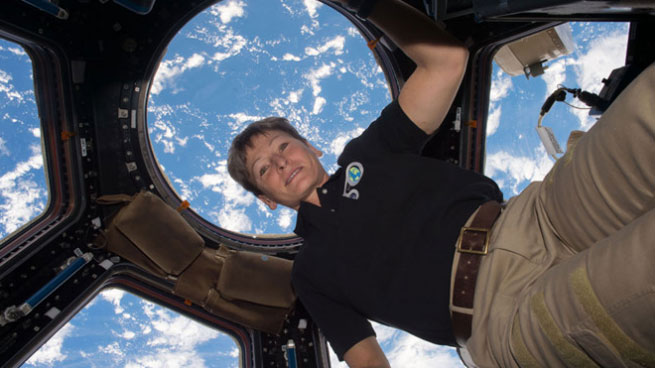The astronaut's brain changes during long journeys
The research team found that the amount of gray matter in the brains of the subjects decreased compared to the initial results.
The brains of astronauts away from Earth for a long time may appear to change in the mass of the three main tissues and these changes may persist after they return to Earth. , according to Space.com. It is a warning from the new study based on data collected from brain scans 10 astronauts have an average stay in the International Space Station (ISS) 189 days.
Accordingly, researchers from Ludwig-Maximilians University Muenchen (LMU - Germany) and University of Antwerp (Belgium) conducted magnetic resonance imaging (MRT) of participants. Astronauts scan the brain before and immediately after returning to the ground after a long time on the ISS. About 7 months later, a group of 7 people continued to have a brain scan.

In June 2017, American astronauts broke the longest travel record in women.(Photo: NASA).
While experts all know about the effects of muscle atrophy and osteoporosis in astronauts who have been forced to live in microgravity for a long time, the extent to which they affect the brain tissue remains is the mystery.
After they returned to the ground, the research team found that the amount of gray matter in the brains of the subjects decreased compared to the initial results. Gray matter is concentrated in the cortex, mainly composed of stem cell neurons. 7 months later, the gray matter was reclaimed, but its level of influence continued to last. On the other hand, cerebrospinal fluid levels increase and gradually replace white matter, which plays a role in connecting nerve nodes.
The impact of this process is still unclear, but experts noted a dramatic decline in eyesight in people who stayed long on ISS. This may be the result of a large accumulation of cerebrospinal fluid over long periods of time, putting pressure on the retina.
The Belgian-German team report is one of several studies that contributed to clarifying the extent of the impact of space travel on human bodies . The results will contribute to the effort to bring people across the boundaries of the planets and conquer new lands.
- The risk of liver damage from long-term flight in the universe
- Astronauts have many problems with their eyes and brain
- The astronaut's brain is distorted in a long-term mission
- Two months of bed research space
- Cosmic rays threaten the astronaut's brain to Mars
- Turn garbage in the universe into radiation shield
- Columbus was not the first to find America?
- Anti-fall protection device for the driver
- Scientists name the professions that reduce brain volume
- The brain can 'look' even though the eyes cannot see
- Secret of taking advantage of the 'brain power' of 20 years old
- Will humans live long in space?
 Van Allen's belt and evidence that the Apollo 11 mission to the Moon was myth
Van Allen's belt and evidence that the Apollo 11 mission to the Moon was myth The levels of civilization in the universe (Kardashev scale)
The levels of civilization in the universe (Kardashev scale) Today Mars, the sun and the Earth are aligned
Today Mars, the sun and the Earth are aligned The Amazon owner announced a secret plan to build a space base for thousands of people
The Amazon owner announced a secret plan to build a space base for thousands of people